Pope Francis issued a call to action regarding climate change in hisencyclical on the environment. In it he wrote, “We need a conversation which includes everyone, since the environmental challenge we are undergoing, and its human roots, concern and affect us all.” America’s most influential faith and moral voices are doing just that by Coming Together in Faith on Climate at the National Cathedral in Washington, D.C. during the pope’s upcoming visit to the United States. Here’s what they have to say on the need for us to join Pope Francis’ call to protect creation...
jim wallis

To mark Pope Francis' visit to the United States, Sojourners has partnered with NextGen Climate to convene key interfaith leaders and activists to welcome the Pope and his call to action on climate change. The effort, including a full-page advertisement Friday in the New York Times and several other newspapers, features a letter signed by 36 interfaith leaders and activists including Rev. Jim Wallis, President and Founder of Sojourners.

AS THE SEASON turned from summer to fall, I was reflecting again about Sojourners’ vocation, the focus of our mission and ministry.
Matthew 25:31-46 is my own conversion text, the scripture that brought me to Christ a long time ago out of the radical student movement. It’s also been a converting text for many others here at Sojourners over the years.
The 25th chapter of Matthew’s gospel has been foundational to Sojourners from the very beginning of the Sojourners community more than 40 years ago. But I am realizing that Matthew 25 is not only foundational for us, it is really our vocational text. In other words, it shapes not just what we believe and what we stand for, but also what we do as an organization—the issues we address, the campaigns we get involved in, the statements we sign, the coalitions we join, and much more.
In that sense, I’ve been thinking about Matthew 25 in relation to issues of organizational stewardship and sustainability. Autumn is always a busy season for me and for Sojourners. Faced with many invitations, requests, and opportunities to make a positive impact on a variety of issues, how do we decide where and how to focus our ministry, energy, staff, time, and gifts? How do we be good stewards of our calling? I think that Matthew 25:31-46 provides the answer. The key moment in the passage is when Jesus says:
I was hungry and you gave me food, I was thirsty and you gave me something to drink, I was a stranger and you welcomed me, I was naked and you gave me clothing, I was sick and you took care of me, I was in prison and you visited me ... Just as you did it to one of the least of these who are members of my family, you did it to me.
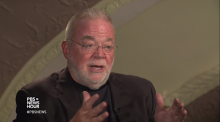
Pope Francis’ strident critique of “unbridled capitalism” has turned heads across the globe. Ahead of his upcoming visit to the United States, American politicians, religious leaders, and laypeople are eager to hear how Pope Francis thinks about economics.
Economics correspondent Paul Solman spoke with Jim Wallis and others in a segment for PBS Newshour about why the pope wants us to stop worshiping capitalism.
Jim Wallis explained how Pope Francis’ critique of capitalism matches God’s vision for the world, as well as the ministry and example of Jesus:

WASHINGTON, D.C. — Faith leaders and immigrant advocates have a new poster child to help push immigration reform through Congress: Pope Francis.
Ahead of the papal visit later this month, immigrants and interfaith leaders held a press conference this week, expressing hope that Francis’ congressional visit could lead “to the beginning of an honest debate of how to fix the broken immigration system.” They also suggested members of Congress should “open their minds and hearts to the Pope’s message.”
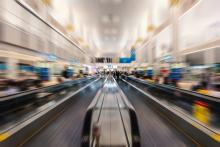
The center of Christianity has dramatically shifted, and that means the agenda was very different from the northern and western agendas of the older white evangelicals in America and the issues they think most important. Korea could play a particular and convening role as a bridge between the churches of the global north and south.
In sharp and grateful contrast to the old ideologies of global North evangelicals, these global South evangelicals spent their time together wrestling with issues of global economic inequality, the realities of climate change, the imperatives of racial justice, and the need for Christians to wage peace instead of war. Since these are the issues that global evangelical and Pentecostal constituencies are facing in their own lives — and of course, the Bible addresses all of them as the central issues Christians need to confront today — the narrow, white American evangelical agenda had no interest in this global evangelical and Pentecostal forum. The fact is that they represent a different evangelical world.
Denominations proliferate in Korea, Rev. Lee said, because church leaders have failed to die to themselves. People are concerned about recognition and their reputation, taking the glory for themselves, instead of for God. And Rev. Lee identified income inequality in South Korea as one of its greatest problems. Again, it calls for dying to the idol of wealth, and putting God’s love, along with serving one another, at the center.
The expected ecumenical agenda of economic justice, peace, protection of God’s creation came before the Jeju Forum in clear and forceful ways. Agnes Abuom, from Kenya, who is Moderator of the WCC Central Committee, said we are slaves to the larger economic and political systems; that’s another way in which we have to die to ourselves, echoing words from the Rev. Lee’s sermon.
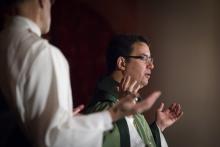
The U.S. Catholic bishops have welcomed the Obama administration’s tentative agreement aimed at limiting Iran’s nuclear ambitions, and their top spokesman on international affairs bluntly warned Congress against doing anything to undermine it.
The bishops “oppose efforts that seek to undermine the negotiation process or make a responsible multi-party agreement more difficult to achieve and implement,” Bishop Oscar Cantu, chairman of the bishops’ Committee on International Justice and Peace Committee, wrote to House and Senate lawmakers on April 13.
“The alternative to an agreement leads toward armed conflict, an outcome of profound concern to the Church,” said Cantu, who heads the Diocese of Las Cruces, N.M.
The warning — and accompanying support in a letter of commendation that Cantu sent last week to Secretary of State John Kerry — follow a thumbs-up from Pope Francis to the proposed accord, and coincides with an endorsement on April 13 by a group of largely liberal mainline Protestant leaders.
Diplomats from the U.S. and six world powers meeting in Switzerland earlier this month unveiled the framework of what could be an historic accord to inspect Iran’s growing nuclear program and prevent it from developing a nuclear weapon.
Editor’s Note: On Monday night, it was announced that a grand jury in St. Louis County found no probable cause to indict Ferguson, Mo., police officer Darren Wilson on any of five possible counts. Throughout the country, protests have erupted. For this week’s edition of the Weekly Wrap, we wanted to offer you the 10 most important things you should see, read, digest to understand the situation. We pray for peace.
1. Letter From Birmingham Jail
by Martin Luther King Jr. Far more relevant than it should be. Print it out. Write on it. Pray through it. "In the midst of blatant injustices inflicted upon the Negro, I have watched white churchmen stand on the sideline and mouth pious irrelevancies and sanctimonious trivialities."
2. PHOTOS: Scenes From Ferguson — and Beyond
Slate compiled these chilling shots from protests in Ferguson, New York City, Los Angeles, Washington, D.C., and more.
3. A Sad Night for America
“It is time to right the unacceptable wrong of black lives being worth less than white lives in our criminal justice system." our criminal justice system."
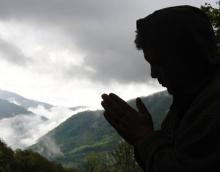
We all know that the world is moving down a very dangerous path, and that we must reverse our direction. But so far, the credible and persuasive scientific case hasn’t accomplished that. Sensible economic proposals haven’t halted that direction either. And smart political arguments have yet to reverse our course either.
Why? Because we are addicted to fossil fuels. The results are planet-threatening climate change and people-threatening terrorism.
We need conversion. Nothing less. Only our conversion could change our dangerous direction.
Two fundamental things could bring the kind of conversion we need.
One, our faith.
Two, our children.
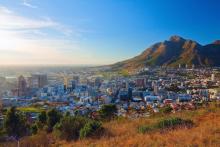
In a township called Khayelitsha, a woman wakes well before dawn to catch a bus that will carry her to the beautiful home in Cape Town where her employer/boss/master wants his tea in bed by 7 a.m. That is what “post-apartheid” South Africa still looks like today.
I just returned from a remarkable month in South Africa—the country that changed my life. I’ve often said that I learned my theology of hope from South Africa, during the anti-apartheid struggle I was thrust into as a young man. South African church leaders invited me in years ago. I got to see and experience the costly movement for freedom in the 1980s, witness the miracle of the inauguration of Nelson Mandela’s rainbow nation in 1994, and later join a wonderful reunion of South African activists, many of whom had been in exile or in prison, along with some of us international allies. So when I set out on a South African speaking and book tour 20 years after the new democracy, I didn’t know what to expect.
This time, I brought my family so they could see the country that had meant so much to me. What I discovered was a new generation of South African leaders ready to define their own vocation and mission as they help build a new nation. I quickly came to understand that making a deep connection with them was the real reason that I had come back. It’s tough to be in the shadow of a heroic generation of leaders like Desmond Tutu whose agenda has been the political liberation of South Africa—accomplished to the amazement of the world. On this trip, 20 years later, I saw the incredible freedom of movement now for all the former racial categories—but also how the systemic geography of apartheid was still painfully evident.
Economic inequality in South Africa is now greater than it was even during the days of apartheid, and gender violence is rampant. So these are the new agendas of a new generation: economic liberation and gender equality, with a commitment to lead on both in the churches. The rainbow of young people who turned up in such great numbers at all of our events truly want a new South Africa— a society yet to emerge.





There’s an old hymn that many Christians have sung for nearly a century. “How Great Thou Art” celebrates the glory of God while considering, “all the works thy hands have made.” It reminds me of the psalm that reads, “The heavens are telling the glory of God; and the firmament proclaims his handiwork. Day to day pours forth speech, and night to night declares knowledge.”
Creation, therefore, is a witness to the wonder and awe of God. Although humanity has been given the honor of bearing God’s image, the earth shows God’s creativity and ingenuity. Over the years I’ve heard so many stories of people finding faith in God, not because of brilliant arguments, but because they are in awe of the complexity and glory of the created world.
But creation is not just a unique witness to God’s glory — it is, as the apostle Paul wrote, “groaning” waiting also for its redemption. This past Easter Sunday, Christians all over the world sang joyful songs of resurrection and renewal. Many of these songs proclaim freedom for all of creation — not just for humanity. One church I know of even sang “Joy to the World,” in celebration that the power of Christ’s resurrection extends “far as the curse is found.”
It’s hard to face, but humanity — image bearers of God — is largely responsible for destroying much of this great witness to God’s glory.

Washington, D.C.—The national “Fast for Families Across America” bus tour campaign ended their journey yesterday in front of the U.S. Capitol building on the National Mall where hundreds gathered in support.
The buses, which returned to Washington after covering more than 90 congressional districts during a seven week tour, joined a female immigration advocacy group, We Belong Together—Women for Commonsense Immigration Reform, whose members have been fasting and praying for the House to pass reform that’s needed to keep their families together.

Christianity consists of thousands of tribes, cliques, and communities — each with different theologies, traditions, and doctrinal beliefs. Within a Westernized society obsessed with celebrity, entertainment, popularity, conflict, and money, it can be easy for Christian groups and communities to clash with each other.
For the modern church, much of its recent legacy has involved conflict, division, and controversy. Christians have developed a love-hate relationship with theologians, pastors, and church leaders — and it’s dividing the church.
Many Christians see their faith journeys as series of either/or situations and decisions — this is bad. Because as much as we want things to be clear, concise, and black-and-white, reality is complex and messy.
Pride, greed, hatred, bitterness, fear, and ignorance often cause Christians to promote distrust instead of unity — but what if Christians were more patient, graceful, and forgiving of each other?

I don’t know what came over me. Was it what Noel Castellanos (CEO of CCDA) had said? What Jim Wallis (President of Sojourners) had said? Perhaps. I couldn’t keep the tears from coming. Walking up Broadway Street in Los Angeles in the middle of a Saturday afternoon as a crowd of people blew horns, held signs, and chanted, “Immigration reform now,” I wept. It was because of Ivone. I was even wearing my Faith is Greater Than Fear shirt but lurking along the sidewalk, not intending to get involved. But it's too late for that. I love Ivone like a sister, I’m already knee deep in it.
Jim, Noel, and Jenny Yang (World Relief) had just been speaking on a panel at the Justice Conference about immigration reform. Jim said that we had to pass comprehensive immigration reform now, before the summer recess. And I knew in my heart that he was right. Because if we don’t, then Ivone will continue to lie in limbo along with 11 million other aspiring Americans, perhaps being deported in a couple of years. We will both continue to live in uncertainty and fear.
Listen as Jim Wallis talks to Sojourners CEO Rob Wilson-Black about giving the send-off speech on values at the World Economic Forum, where the pair brushed shoulders with some of the most prominent business minds. Here's a brief look at what Jim was trying to do with his talk:
"The pope reminded us about the excluded. This gathering is the most included gathering in the world. You are the most included people in the global economy. How will the most included reach out to the most excluded and bring them in to the global economy? That's what I want [World Economic Forum attendees] to ask themselves."